Politics
A political history of post-1977 Sri Lanka
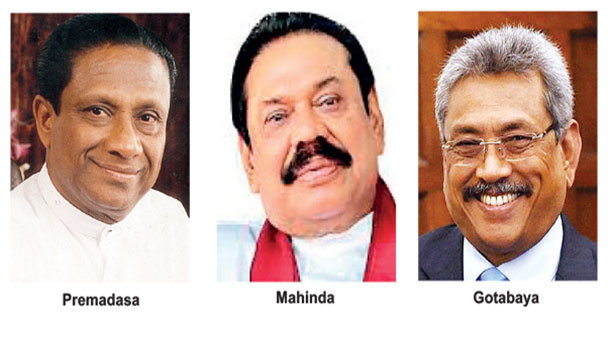
A crucial difference between Bonapartism and fascism is that the one responds to the public and the other regiments it. Bonapartism can deteriorate into fascism, as it not infrequently does, yet its populist-pluralist character deters it from doing so, unless its co-option by a right wing fringe group makes such a transformation inevitable.
There were three Bonapartist revolutions in post-Independence Sri Lanka. The first was Ranasinghe Premadasa’s election in 1988, the second Mahinda Rajapaksa’s election in 2005 and his re-election in 2010, and the third Gotabaya Rajapaksa’s election in 2019. I consider Premadasa, Mahinda, and Gotabaya as being more Bonapartist than fascist, contrary to most accounts of them by liberals and left-liberals.
What of the first Bonapartist revolution? Mervyn de Silva called the 1988 election, an event of sociological significance on account of its winner. Ranasinghe Premadasa has been called many things by many people. At the end of the day, regardless of whatever epithets, he was a Bonapartist tied, despite his populist trappings, to the Right. To say this is not to underrate his contribution: almost overnight, he oversaw an overhaul of J. R. Jayewardene’s economic policies without fundamentally deviating from them.
Foreign policy wise, Premadasa differed from Jayewardene’s pro-Western posturing. In 1977 Jayewardene had stated that his policy of non-alignment would be “more genuine” than what it had been under his predecessor. Two years later, however, the New York Times reported his famous quote about non-alignment, the US, and the Soviet Union. As K. M. de Silva and Howard Wriggins have noted in their JRJ biography, he was not a little reluctant to assume the role of the NAM’s chairmanship. His rapport with Fidel Castro at the 1979 NAM Conference in Havana, for all his theatrics, belied his tilt to the US.
Goh Chok Tong’s and Lee Kuan Yew’s visits to Sri Lanka reinforced the belief that Sri Lanka would resume its long anticipated journey to becoming the Singapore of South Asia, a prospect promised by the Mahaweli Development Scheme. This placed the country on the backbenches of the pro-Western bloc in the Non-Aligned Movement. Yet while Jayewardene courted European and American support, he was careful not to alienate the non-Western bloc. This explains his selection of A. C. S. Hameed as Foreign Minister.
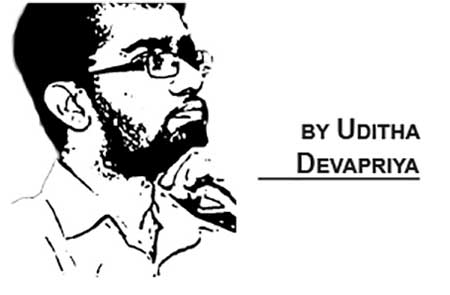 It also explains his selection of Premadasa as an emissary to multilateral institutions. At the UN General Assembly in 1980, Premadasa called upon developed countries to shoulder responsibility for underdeveloped countries. Responding to a remark by Michael Littlejohns (Reuters) that OPEC’s intransigence was preventing the First World from helping the Third, he countered, “You can keep on saying that, but it will do no one any good.”
It also explains his selection of Premadasa as an emissary to multilateral institutions. At the UN General Assembly in 1980, Premadasa called upon developed countries to shoulder responsibility for underdeveloped countries. Responding to a remark by Michael Littlejohns (Reuters) that OPEC’s intransigence was preventing the First World from helping the Third, he countered, “You can keep on saying that, but it will do no one any good.”
It hardly need be added that after assuming the presidency, Premadasa took positions on foreign policy which contradicted some of Jayewardene’s, such as his expulsion of David Gladstone and his closure of the Israeli Special interests Section at the US Embassy; the latter act went as far as to provoke a confrontation with Stephen Solarz, who had been more favourably inclined towards his predecessor and had gone as far as proposing his name, and that of Rajiv Gandhi, for the Nobel Peace Prize vis-à-vis the Indo-Lanka Accord.
Back home, he courted considerable support among sections of the bourgeoisie as well as the petty bourgeoisie, including artists and the clergy (as seen in the latter’s act of siding him after Gamini Dissanayake and Lalith Athulathmudali campaigned against him). Yet in one respect he remained a part Bonapartist and not a total one: his inability to respond to the cultural critique of his political programme.
One should not be hasty in taking him to task over this, since with his assassination, his presidency became unfinished business. Nevertheless, unaddressed and unresolved, this critique widened a vacuum filled by the Jathika Chintanaya; I have attempted to chart the latter’s evolution from an intellectual to a political movement in a previous essay. All that needs to be noted here is that the absence of a political critique of neoliberalism during the Jayewardene and Premadasa presidencies helped consolidate a cultural critique of, not neoliberalism, but the idea of Western civilisation itself.
What helped such a critique gain even more ground was the capitulation of the Left to the neoliberal Right within the SLFP, and the dismantling of the state by the first Chandrika Kumaratunga government. The latter point is significant, for unlike J.R. and Premadasa, whose economic reforms required the centralisation of political power, Kumaratunga set about rolling back the state while opening up the economy.
As Dayan Jayatilleka has observed correctly, the co-option of the Kumaratunga regime by NGOs and the new “civil society” did much to provoke the nationalist lobby. Incensed, her nationalist supporters sought a third force. In the absence of a viable Left alternative – for Kumaratunga’s first term was marked by the deterioration of the Left within the People’s Alliance – nationalist critics of neoliberalism turned to the neoconservative right. Indeed, having decimated the Left within the SLFP, something not even three UNP administrations could do, Kumaratunga paved the way for a nationalist backlash.
In addition to strengthening the nationalist lobby, by axing or relegating to the background the Left faction of the SLFP, Kumaratunga not only moved her party to the neoliberal Right, she compelled the UNP to follow suit. Surprising as it may seem now, the UNP under Ranil Wickremesinghe at first opposed Kumaratunga over several sensitive issues, including her proposed Federal Package. In the second CBK presidency, however, the UNP did a volte-face on those same issues, not just moving to the right and embracing the gospel of peace at any price, but also abandoning its own Premadasa legacy.
In 2000, Dinesh Gunawardena’s Mahajana Eksath Peramuna joined the People’s Alliance. At the parliamentary election that year, he contested and retained his seat; he would do the same at elections the following year, becoming Minister for Transport and rescuing the SLTB from the neglect and squalor it had been reduced to by then.
Gunawardena’s ideology – an impeccable blend of socialism and popular nationalism, not unlike his father’s – provided an impetus to a revolt within the SLFP. That revolt culminated in 2004 when an overwhelming majority of the party stood behind Mahinda Rajapaksa’s bid as party candidate for the presidential election. Rajapaksa breathed life to Bonapartism in Sri Lankan politics thereafter, becoming an heir of sorts to Premadasa; not for no reason, after all, does Dayan Jayatilleka often compare the two with one another.
Where Rajapaksa differed from Premadasa was the acceptance he won among the Jathika Chintanaya ideologues and the Hela Urumaya MPs, as well as the Left (the Old Trotskyites, Communist plus the New JVP). Not that their objectives ever converged; the Hela Urumaya, for instance, sought a wider post-war political agenda than the Jathika Chintanaya, which set them on a collision course with the Left.
The firebrand of the JHU, Champika Ranawaka campaigned for Rajapaksa in 2005 and 2010 on the understanding that once they ended the war, they would enact reforms that would free the public sector from the inefficiencies and the culture of corruption which two and a half decades of untrammelled privatisation had pushed it to.
When he and Rajapaksa disagreed over the direction the latter took towards the end of his second presidency, Ranawaka not only had to leave the government, he had to leave it while being forced to shed his nationalist credentials. That says something about how Rajapaksa stole the nationalist light from its initial torchbearers.
Today Ranakawa is caught adrift: on the one hand the Sinhala nationalist crowd attacks him as a renegade, while on the other minority communities distrust him over his past. This was summed up at last year’s parliamentary polls: despite being given the No 1 preferential vote aboard the Samagi Jana Balavegaya in Colombo, Ranakawa came second from last to Mano Ganesan; the Sinhala middle bourgeoisie vote which he coveted went to the SLPP, while the SJB vote trifurcated between the Premadasa Central Colombo, Harsha de Silva’s suburban middle-class, and the Rahuman-Ganesan minority blocs.
It goes without saying that Mahinda Rajapaksa became not just a Bonapartist, but a total Bonapartist. He remained so long after the JVP and the Hela Urumaya left his coalition, and remains so even now. As for his brother, and whether he has become a right-leaning version of himself: well, it has been two years, and a lot can happen in four. The point about history, after all, is not that it never ends. The point is that it is always being written.
The writer can be reached at udakdev1@gmail.com
Features
The Government’s Term Tests & Results: The Good, the Bad and the Ugly
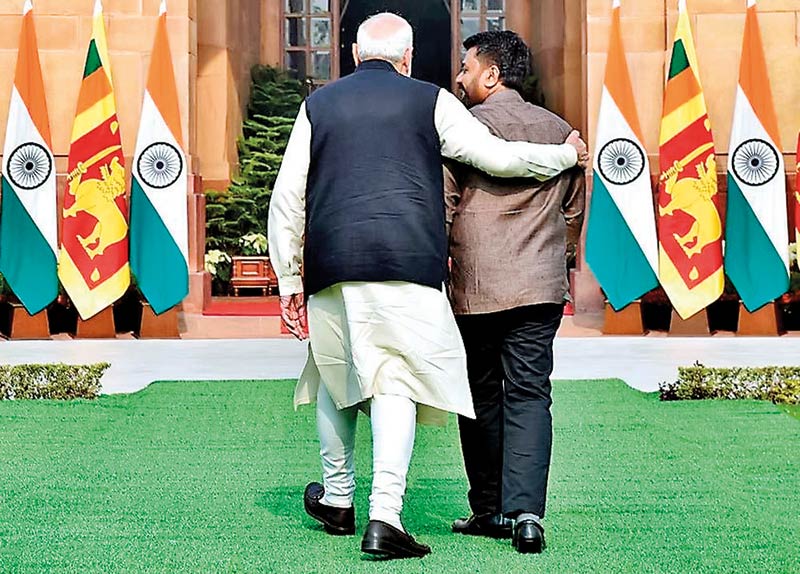
by Rajan Philips
A newspaper editorial suggested that the NPP government is facing its December term test and that its weaknesses are showing. In fact, there have been quite a few term tests set up by different pundit examiners and they are producing a mixed bag of results. Overall and objectively, if I may say so, the government has done a reasonably good job for the most part; with a few bads, mainly gaffes, including a Prime Ministerial gaffe involving the two ‘Chinas’; and one standout ugly – the pathetic “PhD in Biochemistry and BSc in Chemical Engineering” lies of Asoka Ranwala MP, and his deservedly quick fall from Speakership grace. The focus has been mostly on his PhD boast, but his claim to a degree in Chemical Engineering is itself an instant hoax. And the leap from Chemical Engineering in Moratuwa to Biochemistry in Japan is manifestly ignorant and creatively stupid.
The real tests have been on the government’s many critics including almost all media outlets – all of them outside parliament as there is no worthwhile opposition within parliament, and all of them wanting to rip a feather off the fledgling AKD presidency and NPP government. The Speaker fiasco has been the critics’ biggest reward so far but even they know that Mr. Ranwala’s stupid twin boasts are a damning indictment of the man’s character but not a fatal flaw of the government. There is no excuse for what this quack of an MP did but there is a limit to which the government can take the blame for it.
There is no question that the NPP government is being asked by numerous critics to show either results or its abilities to produce them almost instantly. Quite a rigorous treatment for a new government and so early in its term. A few of the critics have still not been able to come to terms with the reality that Sri Lanka now has a new JVP (NPP) government. Others are in it for the ride, and also because many of them do not have the same cordial access to the inner circles of the present government as they would have had to its (Ranil-Rajapaksa) predecessors.
All that said, the government with so many new MPs and Ministers is still on a long learning curve, and there are miles to go before it has its real ‘term test’ – the next general election, which one would hope will only be a parliamentary election without another presidential election. And miles to go in many directions involving different ministries and new initiatives.
This Sunday, it will be 90 days since the presidential election and 37 days after the parliamentary election. At the year end, President Dissanayake will be completing his first one hundred days in office, while his full government would have been in office for 47 days. So far, it is the President who has been the centre of all actions and attention. If the government is serious about transitioning to a parliamentary democracy, other cabinet ministers must and must be encouraged to step up and take responsibility for their portfolios in a very public manner as it used to be before 1977 and even until 1994.
People’s Pre-occupations
While President AKD’s first hundred days may not have been spectacular, they have been solid. He could be proud of his tone setting inaugural speech to parliament, his leadership in providing continuity on economic matters, the setting up of a compact cabinet, and the deft handling of his first official visit to India, the island’s preponderant neighbour. While these are commendable accomplishments, the people’s preoccupations are about the availability of essential goods and the affordability of their prices. The government has not found its stride on either front.
Rice and coconuts, among other essentials, have become thorny issues both in terms of rising prices and growing shortages. Fuel and electricity costs are added concerns, though there have been reductions in fuel prices. People and even critics are willing to give the new government some slack, but because so much was promised by the NPP during the election campaigns that order and fairness will be restored in the supply and sale of essential goods and services, the general public and critics have been expecting to see at least different approaches to these problems by the new government even if there are no immediate results arising from them.
Rice, Sri Lanka’s perennial political problem, is now the NPP government’s primary problem. There are both shortages and the uncertainty of prices, which will have to be addressed promptly to avoid facing the fury of the people. The usual quick fixes like price control and supplementary imports are creating more confusion than resolution. The paradox of high levels of rice consumption and the relative poverty of the farmers who produce rice is a longstanding structural problem. But if NPP were to be worth its salt it needs to get cracking on some of these structural problems.
The most notorious of them and where immediate action is needed is the stranglehold that of about six large rice millers have on the rice market. They virtually control the upstream purchase of paddy in large quantities, provide for intermediate processing and storage in massive capacities, and similarly control the downstream sale of rice to wholesalers and retailers in the distribution market. In addition, the rice millers who have benefited hugely from bank credit facilities to build up their milling industry have now become the primary lenders for the poor farmers and producers of paddy. They have taken advantage of the lack of regulatory oversight under successive governments and now become out of control monsters.
In their 2022 research paper on Rice Milling Economics and Market Power, WAN Wijesooriya and IV Kuruppu, two Agrarian Researchers, recommend government initiatives for establishing a comprehensive database covering the rice milling industry in the country, and for encouraging the growth of medium scale millers to break the stranglehold of the largest rice mill holdings. If the NPP government wants to succeed where previous governments have not only failed but did not even try, it must make use of the agrarian expertise available in the country and spearhead a systematic approach to break the stranglehold of the large rice millers. Anything less will be fruitless tinkering with a longstanding problem. The government must also encourage its subject Ministers to take the lead on these matters rather than channelling any and all files all the way to the President’s desk.
Indian Visit
I am not sure whether Sri Lanka’s current rice crisis came up for discussion during the President’s otherwise successful official visit to India. I do not recall if the word rice being in any of the reports or statements on the visit. Rice may not be the only missing word. There have been no references to 13A, or its plus or minus. For the first time, according to one wordy observer, the word ‘Tamil’ has been missing in all the public pronouncements of the visit. During his first meeting with a Sri Lankan President (Mahinda Rajapaksa) in 2014, Prime Minister Narendra Modi famously reset the bilateral clock to 13A. Perhaps 13A was a bone of contention when the Rajapaksas were at the helm.
Not anymore, it would seem, with a different President, a new government, its tone and messaging, and most of all the topsy turvy election results in the North and East of Sri Lanka. The NPP government could not have hoped for a better start with India on, for want of a less offensive word to some ears, the ‘Tamil’ file; but it has quite a bit of homework to keep it going the way it has started. The objective should be not to ‘disappear Tamil’ as a bilateral subject, but to accommodate Sri Lanka’s Tamils, Muslims and the Tamils of recent Indian origin as equal citizens in law and fact, in a not too distant post-racial Sri Lanka.
For all the historical ties and the geographical proximity between India and Sri Lanka, the relationship between the two countries in the twenty first century is both seen in and defined by the backdrop of China. President AKD’s visit was seen both as a test and as a signal as to which way he might be leaning considering the fact that his two predecessors have been wildly inclined to one side or the other.
Ranil Wickremesinghe, as former president, has been egging President AKD to go all in with India and follow the vision statement he co-announced with Modi in India without any reference to anyone back home. On the other hand, Mahinda Rajapaksa since becoming President in 2005 tilted Sri Lanka significantly towards China without unduly disturbing India. Which way will the wind be blowing with President AKD, has been the question on the minds of all observers of the little Indian Ocean drama involving Sri Lanka.
To his credit, President AKD flew straight and was sincere and honest in his interactions in New Delhi, and he could be expected to be similarly straight, sincere and honest when he goes to Beijing. Enough has been said about the range of topics for co-operation between India and Sri Lanka that was covered by the two leaders and articulated in their joint statement. The areas of co-operation between Sri Lanka and China may not be so extensive on paper but have been quite substantial on the ground.
The challenge to the NPP government, in my view, would be to take a comprehensive review of the plethora of projects in Sri Lanka that have been and are slated to be undertaken by the two Asian giants, make an assessment of their costs and benefits, and to have an integrated internal plan to ensure that the country would maximize the benefits of these projects, while minimizing environmental impacts and avoiding waste and duplication of resources.
Features
The burden of expectations
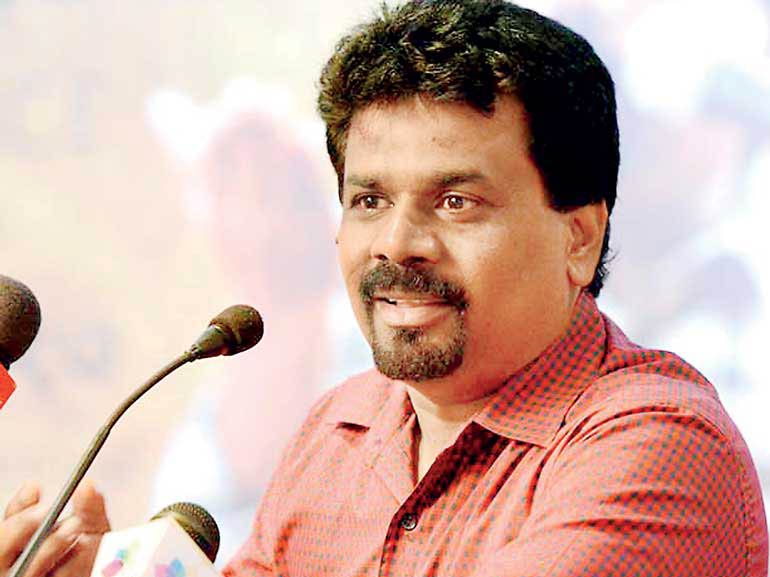
By Uditha Devapriya
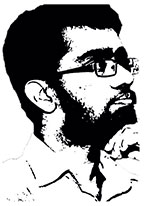 Compared to the excesses of the yahapalana or good governance regime, and the Gotabaya Rajapaksa raj that followed it, the omissions of this government seem trivial and innocent. The NPP is now two months in office, and whether we like it or not, the excitement of those early days is fading away. One can almost see the end of the honeymoon around the corner. The cynics are, of course, growing louder. They are all speaking with one voice – and in one tongue – and they are all saying that the government is doing precious little.
Compared to the excesses of the yahapalana or good governance regime, and the Gotabaya Rajapaksa raj that followed it, the omissions of this government seem trivial and innocent. The NPP is now two months in office, and whether we like it or not, the excitement of those early days is fading away. One can almost see the end of the honeymoon around the corner. The cynics are, of course, growing louder. They are all speaking with one voice – and in one tongue – and they are all saying that the government is doing precious little.
The Speaker of the Parliament must be beyond reproach. He must be like Caesar’s wife, and above suspicion. It does not do for someone constitutionally bound to integrity to lie about his credentials, as his critics allege him, and the government of which he is a part, as having done. Moreover, to me, the doctorate scandal highlights a bigger issue: the obsession that many Sri Lankans, in the public or private sector, have with their qualifications, and the mad rush among many of us to award ourselves honours we either do not have or do not deserve. In this, for better or worse, the Speaker is only too representative of many of his colleagues in parliament, and many of the people he is representing.
Yet once we account for the fact that the NPP/JVP has never been in power before – unless you count the parivasi (probationary) coalition of 2004 – once we acknowledge that the parliament is seeing a plurality of new faces for the first time since 1994, that the old faces have been wiped off from the face of the legislature and a new generation is in charge – once we get around adjusting ourselves to these realities, then we must realise that this too is an elected government, which, like its predecessors, needs to be kept in check.
Much of the criticism of the NPP’s actions, and inactions, come from those who have sinned for far too long to have any semblance of credibility. These are the Ranilists, the Rajapaksists, those who are glad the NPP is in power because that gives them the perfect opportunity to exact revenge on their rivals. The NPP, we must remember, has been in opposition for too long. They have, at every step of the way, pointed out the errors of those in government and the Opposition. When Harsha de Silva questioned the NPP’s ability to lead, Anura Kumara Dissanayake’s response was to band him and Ranil Wickremesinghe together, to liken them to birds of the same feather. Today, however, Dissanayake is President.
If the rise of the populist left hasn’t (yet) united the right, it appears to be doing so. True, the SJB and UNP – or the New Democratic Front (NDF) – don’t seem to be getting together. But some MPs, including certain bigwigs from the SJB, have hinted that they would be open to Ranil Wickremesinghe joining the SJB. These are, to be sure, minority voices. But they can well grow louder if the NPP fails. And the way things stand, the NPP can fail in two ways: it neglects its radical mandate and caves to the right, or it commits the same errors it accused other parties, both in government and Opposition, of doing.
On both counts, the NPP is playing with fire. It has opened itself to misinterpretation and critique, from both the left and right. A good example, perhaps the best one, is the IMF agreement. Now, it is not true that the NPP said at the outset, before it assumed power, that it would exit the IMF. That was never its promise, and to pretend otherwise would be disingenuous. Yet the NPP did give rise to expectations that it would at least talk to the IMF on a possible renegotiation of the terms.
President Dissanayake, to be sure, did stress on the importance of social protection during a meeting with the IMF delegation. Yet the situation has become so complicated that both Sajith Premadasa, the leader of the centre-right Opposition, and Ravi Karunanayake, the former Finance Minister who was at the heart of a financial scandal a decade ago, have questioned the NPP for continuing the reforms of the previous administration. “Don’t signal to the left, and then turn right,” Karunanayake recently advised the NPP.
In this, officials of the Wickremesinghe government have had it both ways – praising the NPP for continuing their reforms, while eviscerating them for their hypocrisy. The People’s Struggle Alliance (PSA) has emerged as the NPP’s critic on the Left, and it too has been vocal in its denunciations. Perhaps the biggest takeaway from all this is that no party can escape the allure of parliamentarianism. As a friend of mine put it, in Sri Lanka it is impossible to do politics without accounting for the vote. And as far as the NPP is concerned, even if they have not entered coalitions with other parties, they have come to power on the strength of the broadest electoral alliance in Sri Lanka’s post-independence history: an eclectic mixture of different, often divergent, class interests.
It is, of course, ironic for a party that called both the UNP and SLFP bourgeois formations in the 1970s – without appreciating the fundamental differences between the two – to cave into the same bourgeois democratic structures it sought to transcend. But this would be a gross misinterpretation of the NPP’s or rather JVP’s history. The JVP did make attempts to re-enter the democratic mainstream – prominently in 1982. But, for close to a decade in the 1980s and early 1990s, it toyed with the idea of going beyond that framework, provoked by the most right-wing authoritarian government Sri Lanka ever elected. Since 1994, it has been trying to course-correct and have it both ways – regain credibility among the masses without going down the route of coalitions and alliances with other formations.
None of this absolves the NPP. It is difficult to defend a government when it falls headlong into one scandal after another. The NPP’s leading faces have all grown silent. Perhaps they have no other choice – they have come to power on the most radical political agenda Sri Lanka has seen since 1970. Does that justify its recent failures, prominently the issue of the Speaker of Parliament? Probably not. As its critics and rivals get together to trip it at every corner, the NPP must realise that it cannot shield itself from censure for long. It must either respond to criticism – as it did, even if half-heartedly, with its statement on the PTA – or it must take decisive action – as it has so far failed to, with the Speaker. The NPP must realise it is no longer in Opposition. It must stop pretending that it is.
Uditha Devapriya is a regular commentator on history, art and culture, politics, and foreign policy who can be reached at udakdev1@gmail.com.
Features
The Silence of the Speaker and other matters
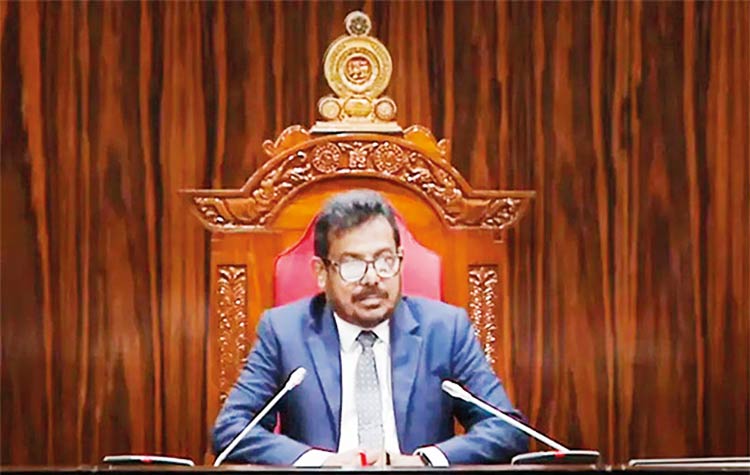
By Anura Gunasekera
It is more than two weeks since the matter of the Speaker, Asoka Ranwala’s doctorate, or lack of it, was raised in public. If he does have one, it is sufficient time for him to have produced the necessary evidence and laid to rest the ongoing speculation. When my daughter acquired a doctorate from a university in England, she was ceremoniously presented with an ornately inscribed scroll, on thick, parchment paper , along with a foolish hat.
To me, a non-academic, it seemed a paltry outcome for the several years of intense study which preceded the award but that, apparently, is how these systems work. Perhaps Waseda University of Japan, the institution alleged to have conferred the doctoral degree on Ranwala, does not emulate old-fashioned British institutions, but there still needs to be tangible, physical evidence of such an award, with which Ranwala came away from that institution.
Ignore the flippancy of the above paragraphs. The issue of the Speaker’s doctorate is a very serious matter. I understand that Ranwala has been using the prefix, “Dr”, for many years before his investiture as the Speaker of the 10th parliament of Sri Lanka. During the run-up to the recent presidential election, he has been introduced on stage as “Dr Ranwala”. Therefore, he deliberately made the world believe that he was a, “Dr.”
Recently there was some talk of Ranwala’s daughter offering an explanation but that is a ridiculous, unacceptable response. An explanation must come from Ranwala, personally, and not from a member of his family. It is a very simple matter, actually; either he has a doctorate or he has been deceiving the world for many years. In the case of the former he needs to furnish immediate proof to the public and if the latter is the reality, he must apologize for having been a public fraud and withdraw from governance.
To be the Speaker of the Parliament of Sri Lanka, a person must be compliant with the conditions of Articles 89 and 91, of the Constitution of the Republic of Sri Lanka. Neither of those articles specify that the Speaker should be literate, or that he should even be able to read, write and speak, in any known language. In fact, there are simply no minimum educational qualifications for those aspiring to represent the people of Sri Lanka in parliament, although there are clearly specified minimum educational qualifications for any person who applies for employment within the Parliament premises, even if it be the position of security guard, premises cleaner, or a minor employee, respectfully distributing glasses of water and cups of tea, to thirsty legislators within the chamber of representatives.
Then why is the issue of the Speaker’s qualifications of such importance?
When public figures, especially those occupying vital positions such as the Speaker of the Parliament, make a false claim about their educational qualifications, it undermines public trust in the political system. The NPP-JVP machine captured power in the last general election, largely on the promise of restoring principled governance to a corrupt country. I voted for candidate AKD at the presidential election in the fervent expectation of transparent governance. Thus, every elector who contributed to elevating the NPP to power, has the right to know whether Ranwala actually possesses the educational qualifications he claims, although those have no relevance to his current position in Parliament, or to the effective delivery of his responsibilities.
This matter is important because it highlights broader issues of accountability and transparency within governance. When public officials are permitted to misrepresent themselves, it points to a lack of scrutiny in the vetting of candidates for positions of power and influence. The fact that such claims go unchecked, also calls in to question the mechanism the party has in place, for ensuring ethical standards and honesty among its members.
Therefore, the quick and equitable resolution of this issue is crucial and central to entire ethos of the NPP regime, as the expectations of honourable conduct it has inspired within the public, is greater by an order of magnitude than that which was expected of any previous regime. It is also an issue which has been seized gleefully by an enfeebled Opposition, to discredit the government, and to move public focus away from the investigations into issues of corruption within earlier regimes, represented by many members now in the Opposition. The Ranwala affair is the first litmus test, of the present regime’s publicly declared ethos of doing only what is right. It needs to prove to the expectant polity that it means business, on every front.
Speaking of the Opposition, the ridiculous, just concluded (or is it?) charade regarding the appointment of individuals to the respective national lists of the Samagi Jana Balawegaya (SJB) and the New Democratic Front ( NDF), illustrates the incompetence, the indecisiveness and the lack of leadership ability of the two party chiefs concerned. It is relevant to remind the reader that these two, Ranil Wickremesinghe (RW) and Sajith Premadasa (SP), were highly vocal in the run-up to both the presidential and the general election, about the lack of governance experience within the NPP. It immediately begs the question, if one does not have the necessary control and influence within the party, to decide on a simple but important internal party issue like a nomination, how can one aspire to govern the country? In reality it is not just an internal party issue but one that concerns the entire national polity, as it is entitled, as of civic right, to see that all 225 seats in the legislature are filled.
Moving on to two equally pressing issues, the high price of coconuts and the non-availability of popular varieties of rice, both are embedded in histories which long precede the installation of the present government.
Coconuts have become progressively more expensive because of increasing consumption and declining production. According to the Sri Lanka Export Development Board (EDB), the annual production ranges from 2,800 mn nuts to 3,000 mn, whilst the combined domestic and export processing demand is around 4,000 mn nuts, annually.
The year-to-year variability of production is linked to climate variations, further compounded by a steady increase in coconut based products since 2012 (EDB). Coconut trees have an economically productive life-span and need to be replaced periodically. However, new planting has also declined drastically, with 2.28 million seedlings being issued in 2021, as against 9.73 million in 2012 and 6.81 million in 2013 (EDB). The 2021 crop had been very high (CRI) but the embargo on inorganic fertilizer imposed around that time by President Gotabaya Rajapaksa, has resulted in declining yields thereafter.
Wild animal depredation also has had a significant impact, suppressing yields and discouraging new planting, resulting in possible decline of production for the future as well. The industry assessment is that the 2024 production will reflect a 40% decline on the 2023 output. Around 33% of the total production is assigned for value added export products with the balance going in to domestic consumption. Thus, with the off-take by industries remaining constant, the volume available to the domestic sector has declined drastically. The grim reality is that unless the national industry is realigned, with viable, sustainable solutions for current problems, coconut prices will continue to rise periodically, well in to the foreseeable future. Solutions should also be able to strike a sensible balance between animal rights and farmer requirements. Animal rights activism, which takes place largely in affluent zones of residential Colombo- acted out by well-to-do urbanites of the city who have never had to defend a paddy harvest from a hungry elephant- has no relevance to the desperate realities of destroyed crops in Dehiattakandiya, Girandurukotte and Ethiliwewa.
The rice shortage, notwithstanding the obvious causes which have been ignored by successive governments in thrall to wealthy rice millers – again not attributable to the present regime – needs both a short-term and a long-term solution. Importing rice from India, as a knee-jerk response to the hunger of an angry nation, is not a sustainable solution but a one-time fix. It cannot happen again as the same scenario is played out the next year as well. The unalterable reality is that we are a rice eating nation and irrespective of the obstacles, that need must be appeased. “Let them eat cake”, whether Marie Antoinette said it or not, is not acceptable.
This regime has a two-thirds majority in Parliament and is headed by a president with supreme power. Should he, as an immediate solution, decide to take the most drastic steps in order to break the rice-millers’ stranglehold on rice stocks, a famished nation will applaud and the Opposition, if they understand what is good for them politically, will not dare raise a whisper in protest.
There are also the many questions which are being asked, regarding the status of pending investigations related to past corruption in high places. The difficulties in resurrecting dormant criminal investigations are understood; files are mislaid, papers vanish, evidence is lost, witnesses die, disappear or are terrorized in to silence, impartial investigators are neutralized and replaced with compliant stooges, cases by the dozen, against the high and mighty, are dismissed whilst authority is subverted. Previous regimes, especially those with the members of the Mahinda Rajapaksa “famiglia” in the right places, reduced these tactics to an exact science.
President AKD himself, in his speech at the recent Anti-Corruption Day, with brutal clarity, exposed the issues involved with reference to actual cases. In the audience were officials who, during previous regimes, may have been complicit in the very acts described in the previous paragraph. This nation, which catapulted the NPP-JVP to power as a last resort, will appreciate a commentary from the president himself, on all of the above issues. From time to time it needs to be assured that the regime is moving in the right direction, and the best person to put its collective mind at rest is the president himself.
-
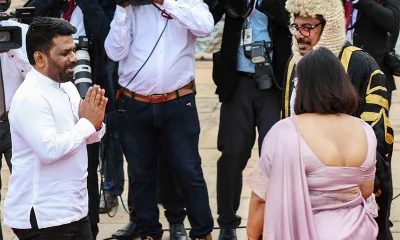
 Features7 days ago
Features7 days agoThe Degree Circus
-
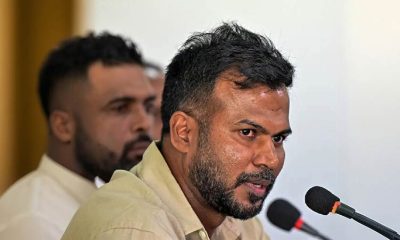
 Sports5 days ago
Sports5 days agoSri Lanka to mend fences with veterans
-

 Sports3 days ago
Sports3 days agoPathirana set to sling his way into Kiwi hearts
-

 Opinion7 days ago
Opinion7 days agoHas ‘Compass’ lost direction?
-
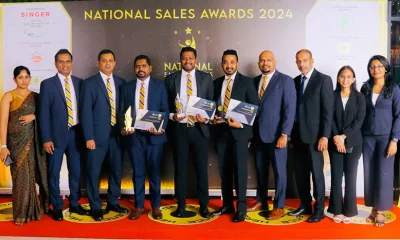
 Business7 days ago
Business7 days agoHNB General Insurance secures top honors at SLIM National Sales Awards 2024
-
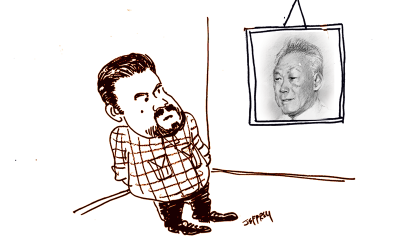
 Opinion5 days ago
Opinion5 days agoIs AKD following LKY?
-

 Editorial7 days ago
Editorial7 days agoCredential inflation and semantic drift
-

 Editorial6 days ago
Editorial6 days agoHobson’s choice and U-turns











